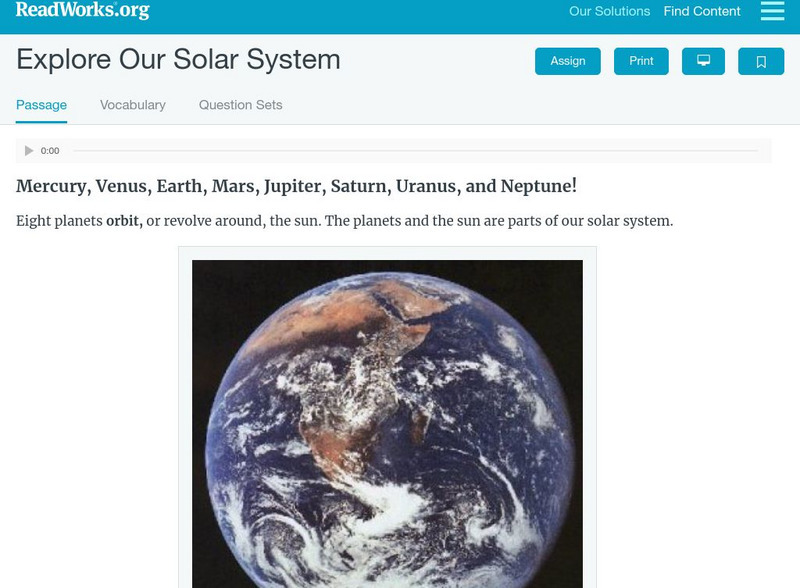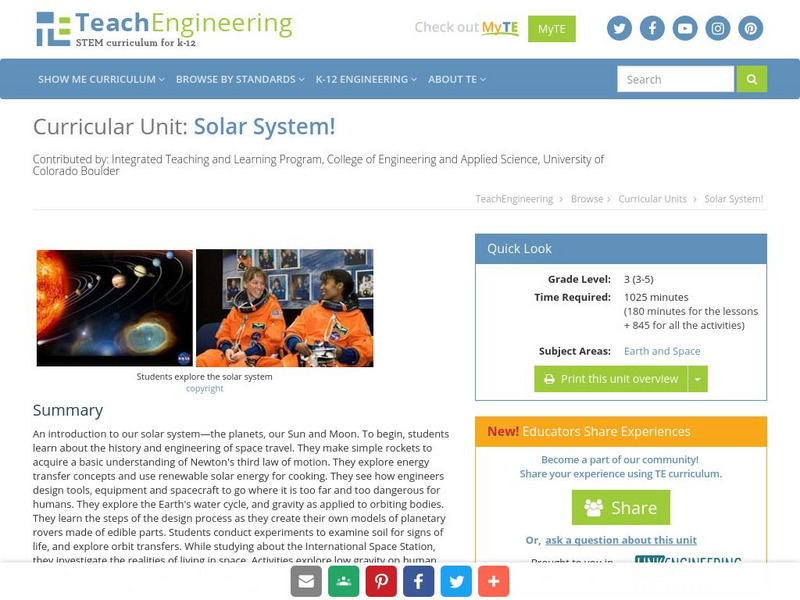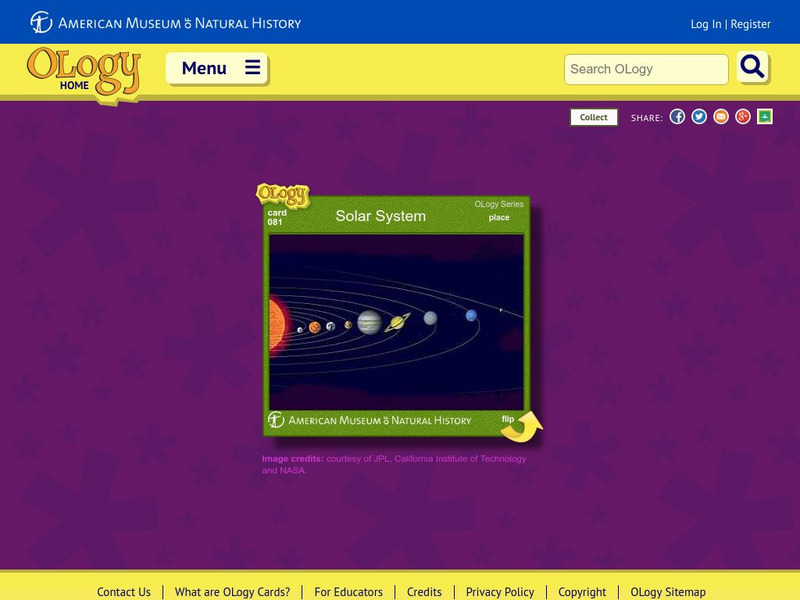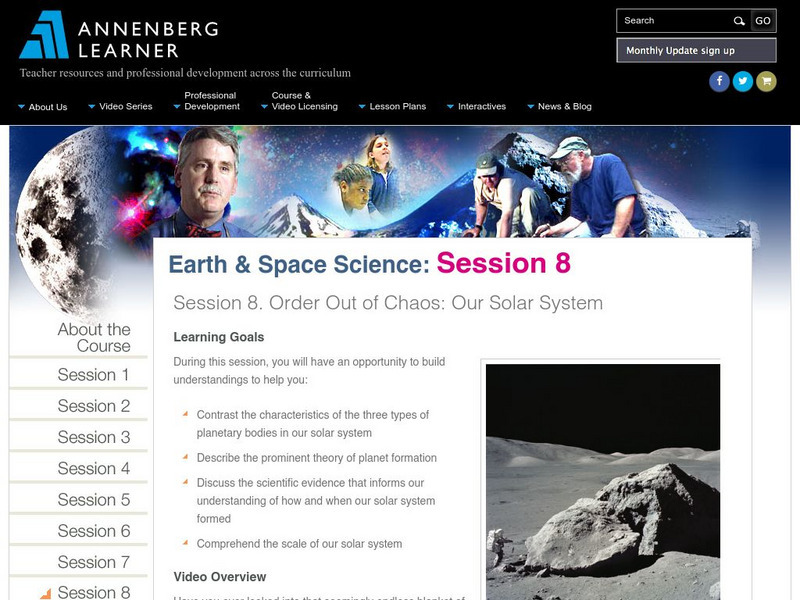Curated OER
Robots from Junk
Students create balloon and rubber band models of robotic rovers to investigate the concepts of mass, torque, and friction. Through research and planning, students construct a rover test-bed that simulates the Martian environment.
Curated OER
The Lepidoptera Project
Students are introduced to Scientific Inquiry and discover how to design an experiment that answers critical questions using butterflies as the topic. They design experiments that compare the number of species of butterflies in a vacant,...
Curated OER
Smog Be Gone
Students begin the lesson by identifying greenhouse gases. In groups, they observe and record the effect of the gases on the atmosphere and the temperature of the Earth. They participate in activities that describe the role of...
Curated OER
Satellite Mobiles
Students discuss satellites and their functions. They design and construct their own satellite out of readily available materials. Students are taught the definition of a satellite. They discuss the two main purposes of satellites:...
Curated OER
Energy: The Big Picture
Students research about energy related topics. In this earth science lesson, students discuss ways to save energy. They create a presentation about their research and share it with the class.
ArtsNow
Arts Now Learning: Explore the Solar System With Theater [Pdf]
In this lesson, students build upon prior knowledge of the planets in the solar system by becoming aliens living on the planets. As aliens, they learn about their planets and create advertisements to persuade someone to visit them there.
NASA
Nasa: Solar System Exploration
This stunning site on the solar system gives a great overview of the planets and our sun. Learn about each object's size, vital statistics, and moons. Then go on for a more in depth look at these objects in the column on the left.
Other
University of Leicester: The Solar System
Resource explores the solar system, with an in depth discussion of each of the planets and their properties.
Read Works
Read Works: Explore Our Solar System
[Free Registration/Login Required] This informational text passage shares facts about planets in the solar system. This passage is a stand-alone curricular piece that reinforces essential reading skills and strategies and establishes...
Smithsonian Institution
National Air and Space Museum: Exploring the Planets: Our Solar System
Take a tour of our solar system and learn fascinating details and observations about the planets.
Other
Royal Museums Greenwich: Origin of the Solar System
This site explores current theories about how the Solar System was created.
TeachEngineering
Teach Engineering: Solar System!
An introduction to our solar system: the planets, our Sun and our Moon. Students begin by learning the history and engineering of space travel. They make simple rockets to acquire a basic understanding Newton's third law of motion. They...
NASA
Nasa: Solar System Exploration
Enter our solar system to interact with the planets, moons, asteroids, meteors, and more. Investigate with NASA scientists and explore missions related to space exploration. Read facts, compare statistics, look through resources, and...
NASA
Nasa: Welcome to From Earth to the Solar System (Fettss)
A collection of high-resolution images of space. Images "showcase the discoveries and excitement of planetary exploration, with a focus on the origin and evolution of the Solar System and the search for life".
NASA
Nasa: Eyes on the Solar System
Are you ready to ride the Curiosity to the surface of Gale crater? This 3-D environment created with NASA mission data allows students to experience space and time. With this website students can also hop on an asteroid, fly a Voyager...
NASA
Nasa: Eyes on the Solar System
This interactive experience allows users to assume different positions and vantage points in space while moving through the Solar System. Also, explore the 2011 Juno spacecraft mission to Jupiter with real-time positioning in space.
Views of the Solar System
Views of the Solar System: The Solar System
Explore the solar system through this site that includes vivid multimedia resources. Learn the latest scientific discoveries, the history of space exploration, and much more. Site includes videos, graphics, articles, and photographs.
American Museum of Natural History
American Museum of Natural History: Solar System O Logy Card
Here's an Ology Card about the Solar System, offering a small image, a definition, and information on how "far out" our Solar System is. Includes questions to quiz your knowledge and quick facts about the Solar System's size, rotation...
NASA
Nasa Science: For Kids: Solar System Fun
Test your knowledge about the solar system with games and activities designed to help explore what you know about the sun, the planets and their moons, space rocks, the Milky Way, and related topics.
NASA
Nasa: Solar System Exploration: The Robotic Exploration of Space
Discover the evolution of robotic exploration of space during the first half of the twentieth century through narrative and images.
Annenberg Foundation
Annenberg Learner: Earth and Space Science: Order Out of Chaos: Solar System
Material to begin an exploration of the Solar System: the characteristics of the planets, theories about planet formation, and more. An hour-long video is accompanied by learning goals, an outline and overview, details on star formation,...
NASA
Nasa: Solar System Exploration: Planets
This impressive compilation of ideas is a great source for space science. Loaded with extra links for further information on the solar system.
NASA
Nasa: Solar System Exploration
A website with various activities for different grade levels covering the subject of space exploration. Activities include building your own solar system, coloring pages, making models, and even a solar system cookbook.
Utah State Office of Education
Utah State Office of Education: How Did the Universe and Solar System Develop?
Explore this unit to learn how the universe began. Through illustrations, videos, and classroom activities, gain an understanding of how stars help with the formation of elements.



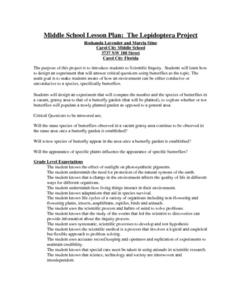



![Arts Now Learning: Explore the Solar System With Theater [Pdf] Lesson Plan Arts Now Learning: Explore the Solar System With Theater [Pdf] Lesson Plan](https://d15y2dacu3jp90.cloudfront.net/images/attachment_defaults/resource/large/FPO-knovation.png)
